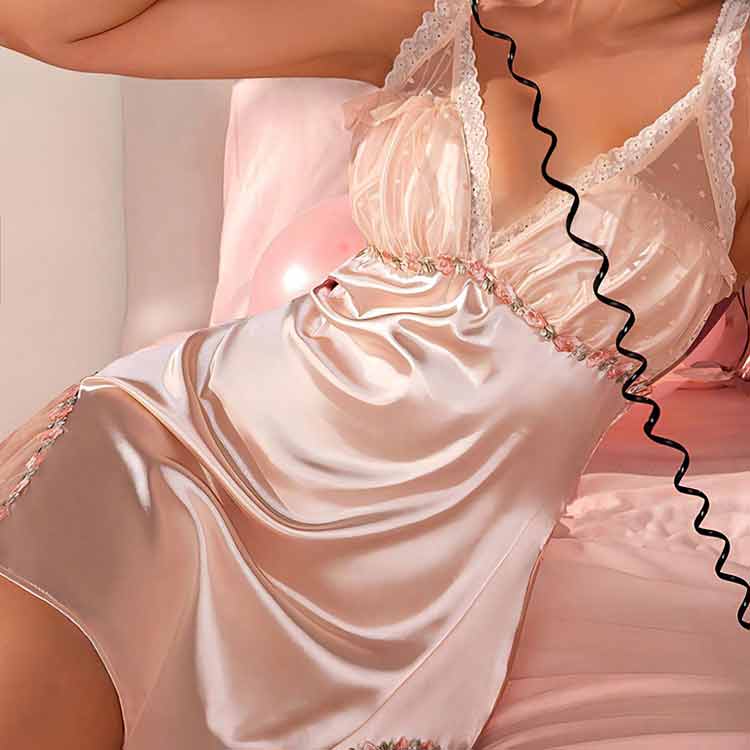What Makes a High-Quality Ladies Nightgown the Ideal Choice for Modern Comfort and Style?
2025-11-18
A ladies nightgown is a sleepwear garment designed to offer comfort, softness, and breathability throughout the night. As consumer expectations for nighttime wear continue to evolve, modern nightgowns are created not only for sleeping but also for enhancing relaxation, supporting skin-friendly comfort, and providing aesthetic elegance for home living. Today’s women expect nightwear to serve multiple roles: restful sleeping, comfortable lounging, and stylish home apparel.
Product Overview and Key Features
A premium ladies nightgown is typically characterized by:
-
Soft, breathable fabrics suitable for different climates
-
Skin-friendly textures that reduce irritation
-
Flexible tailoring that accommodates movement
-
Aesthetic details such as lace trims, draped silhouettes, or minimalist cuts
-
Moisture-management functions for night-long freshness
-
Durability through reinforced stitching and fade-resistant materials
Product Parameters (Table Format)
| Parameter Category | Details |
|---|---|
| Material Options | Cotton, Modal, Rayon, Satin, Silk-blend, Bamboo Fiber |
| Fabric Weight | 120–180 gsm depending on season |
| Length Options | Knee-length / Mid-calf / Full-length |
| Size Range | XS – 3XL (customizable per region) |
| Neckline Styles | V-neck, Round neck, Square neck, Spaghetti strap |
| Sleeve Types | Sleeveless, Short-sleeve, ¾ sleeve, Long-sleeve |
| Color Choices | Pastel shades, neutrals, florals, classic solids |
| Functional Add-ons | Anti-shrink, anti-pilling, moisture-wicking, quick-dry |
| Recommended Seasons | Spring/Summer lightweight; Fall/Winter thermal designs |
| Special Features | Stretch fabric, lace accents, button-front openings |
These parameters ensure that customers can understand the full capabilities of the product and choose the most suitable nightgown for personal comfort and lifestyle needs.
Why Do Ladies Prefer Modern Nightgowns and Why Are Their Advantages Increasingly Important?
Why Comfort Has Become a Top Priority
Comfort is the core reason many women choose nightgowns over other sleepwear styles. The modern lifestyle has increased demand for high-quality rest, leading to sleepwear choices that support better relaxation. Premium nightgowns reduce friction against the skin, regulate body temperature, and encourage a feeling of ease, especially during long hours of sleep.
Why Fabric Technology Enhances Daily Well-Being
Fabric innovation has dramatically improved the performance of ladies nightgowns. Breathable cotton remains a popular choice, but advanced blends such as modal and bamboo fiber provide additional softness, temperature control, and moisture absorption. These fabrics help maintain a clean and dry feeling throughout the night, especially in warm climates or during seasonal transitions.
Why Tailored Designs Improve Body Support
Nightgowns now follow ergonomic design principles. Features such as flowy hems, relaxed armholes, stretchable back panels, and adaptive waistlines ensure that users experience no tightness or discomfort while shifting during sleep. These optimized silhouettes also flatter a variety of body shapes, increasing confidence and ease.
Why Durability Influences Consumer Choice
Consumers increasingly value long-lasting garments. Reinforced stitching, anti-shrink finishes, and fade-resistant dyeing help nightgowns maintain their form and color after repeated washing. This durability adds value, making premium nightgowns more cost-effective in the long term.
Why Aesthetic Appeal Matters in Modern Home Living
Nightgowns are no longer limited to purely functional sleepwear. Modern designs incorporate fashion elements such as lace, embroidery, or contemporary minimalist cuts. Many women seek nightwear they can comfortably wear while reading, relaxing, or working from home. Thus, the balance between elegance and comfort is a major purchase driver.
Why Versatility Strengthens Market Growth
Nightgowns can serve multiple purposes: sleeping, lounging, and even pairing with robes or cardigans for casual home dressing. This versatility makes the product suitable for different age groups and cultural preferences, supporting global demand.
How Are Ladies Nightgowns Evolving With Future Trends and How Will Innovation Shape the Market?
How Material Innovation Will Transform Comfort
Future nightgown development is predicted to include:
-
Advanced eco-friendly fibers
-
Sustainable dyeing techniques
-
Temperature-adaptive materials
-
Ultra-soft bio-based fabrics
-
More breathable lightweight weaves
As environmental awareness grows, sustainable materials such as bamboo viscose or organic cotton will become increasingly important. These fabrics reduce environmental impact without compromising softness.
How Smart Construction Techniques Will Enhance Performance
Improvements may include:
-
Seamless bonding to prevent friction
-
Precision stitching for added durability
-
Lightweight thermal layers for winter designs
-
Elastic pattern engineering for contour-friendly shaping
These techniques will help nightgowns feel lighter, smoother, and more luxurious.
How Fashion Trends Will Influence Nightwear Design
Upcoming design trends may include:
-
Minimalist silhouettes with clean lines
-
Soft pastel colors and warm neutrals
-
Textured fabrics for visual layering
-
Delicate lace and embroidery for elegance
-
Multi-use designs suitable for day-to-night home wear
The fusion of sleepwear and loungewear will continue rising as consumers prioritize comfort throughout daily routines.
How Market Behavior Will Shift With Consumer Expectations
Consumers increasingly demand:
-
More inclusive sizing
-
Comfort-first designs
-
Sustainable manufacturing
-
Long-lasting fabrics
-
Multi-occasion home dressing options
Brands that adapt to these expectations will gain higher visibility and customer loyalty.
What Are the Most Common Questions About Ladies Nightgowns? (Comprehensive FAQ Section)
Q1: What fabric is the best choice for a ladies nightgown?
A1: The ideal fabric depends on climate and personal preference. Cotton offers breathability and softness, modal provides silky comfort and drape, bamboo fiber enhances moisture absorption, and satin or silk-blend options give a smooth, luxurious feel. Lightweight fabrics are suitable for warm seasons, while thicker knit materials provide warmth in cooler months.
Q2: Why is the fit of a nightgown important?
A2: A proper fit ensures unrestricted movement during sleep. A nightgown that is too tight may cause discomfort, while one that is too loose may affect warmth retention. Modern ergonomic tailoring allows the garment to adapt naturally to body shape, providing both comfort and visual appeal.
Q3: How should a nightgown be washed to maintain softness?
A3: Most nightgowns should be washed with mild detergent in cold or lukewarm water. Gentle cycle washing and air drying are recommended to prevent shrinkage or fading. Avoid strong bleach or high-heat drying, as these may degrade fabric fibers.
Q4: What length is recommended for different body types?
A4: Knee-length nightgowns offer relaxed mobility and are ideal for warm weather, while mid-calf or long designs provide better coverage and elegance. Personal comfort and seasonal needs usually determine the best choice.
Q5: Why do lightweight fabrics benefit warm-weather sleeping?
A5: Lightweight fabrics promote airflow, reduce heat absorption, and keep the body cool. This helps prevent night sweating and enhances overall comfort during sleep.
Q6: How does moisture-wicking technology improve sleep quality?
A6: Moisture-wicking fibers draw perspiration away from the skin, keeping the body dry throughout the night. This feature is particularly effective in humid climates or for users who experience nighttime warmth.
Q7: What features make a nightgown suitable for winter?
A7: Winter nightgowns often use thicker fabrics such as brushed cotton or thermal knit. Long sleeves, full-length designs, and insulated layers help maintain warmth during colder seasons.
Q8: How does design influence comfort and movement?
A8: Elements like relaxed sleeves, stretchable fabrics, adjustable straps, and flowy silhouettes ensure that movement is not restricted during sleep. The absence of harsh seams also reduces irritation.
Q9: Why are color and style important in homewear?
A9: Colors and design elements contribute to emotional comfort. Soft tones promote relaxation, while stylish cuts allow users to feel confident while lounging or performing light household tasks.
Q10: How long does a high-quality nightgown typically last?
A10: With proper care, a durable nightgown can maintain its shape, softness, and color for 1–3 years, depending on usage frequency and fabric quality. Reinforced stitching and anti-pilling finishes further extend lifespan.
Q11: What size range is most suitable for inclusivity?
A11: A size range from XS to 3XL helps accommodate different body shapes. Some manufacturers also offer extended sizes to ensure universal accessibility.
Q12: How do breathable materials support sensitive skin?
A12: Breathable fibers reduce sweating and friction, helping prevent rashes and irritation. Fabrics like cotton, modal, and bamboo are particularly suitable for sensitive skin types.
Q13: Why choose a nightgown instead of pajamas?
A13: Nightgowns provide superior airflow and unrestricted movement compared to two-piece pajamas. They are also easier to put on, require fewer adjustments during sleep, and offer elegant silhouettes.
Q14: How does lace trimming affect comfort?
A14: High-quality lace is soft and flexible, adding decorative appeal without scratching the skin. Proper stitching and placement ensure the lace remains gentle and durable.
Q15: What seasonal considerations should be made when choosing a nightgown?
A15: Summer requires breathable lightweight fabrics, while winter calls for thicker thermal materials. Climate, personal comfort, and household temperature conditions all influence seasonal selection.
How Does Hongxing Contribute to the Future of Ladies Nightgowns?
The future of ladies nightgown development depends on innovation in materials, refined ergonomic designs, sustainable production, and lifestyle-oriented functionality. As consumers increasingly prioritize comfort and style in everyday home living, demand will continue to shift toward nightgowns that offer softness, breathability, durability, and elegance. Brands that invest in advanced fabrics and thoughtful tailoring will define the next generation of sleepwear.
Hongxing is committed to providing high-quality ladies nightgowns that combine comfort with modern aesthetics, aligning with global trends and evolving customer expectations. For detailed product information, customization options, or cooperation inquiries, contact us to learn more about our full range of ladies nightgown solutions.



